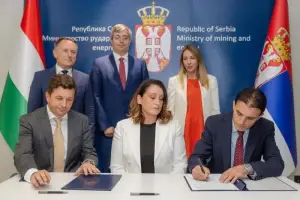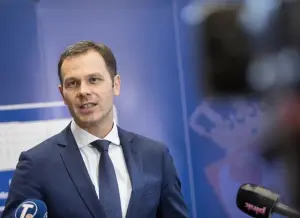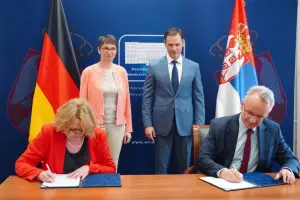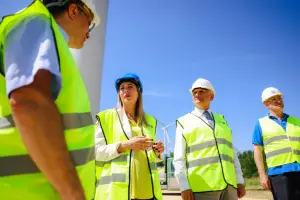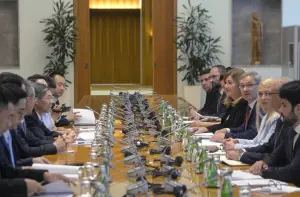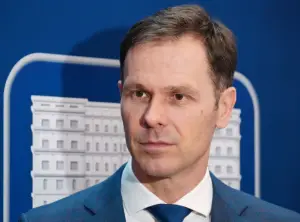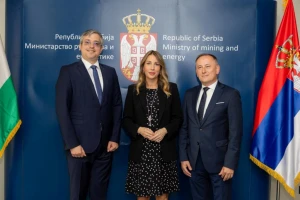Q:
A:
Italian investors invited to invest in Serbia
Belgrade,
15 April 2013
Minister of Finance and Economy Mladjan Dinkic called on the Italian investors to invest in Serbia, highlighting Serbia’s numerous advantages, including favourable tax system, a skilled workforce, financial incentives for investment and free trade agreements with the EU, Russia and other countries.
Dinkic, in an address to the Italian business delegation that is visiting Serbia, said that in Serbia there are about 500 companies from Italy, which employ about 20,000 people.
In 2012, those companies had a turnover of €2.5 billion, he said.
According to him, thanks to the investment of Fiat this year, the annual turnover of Italian companies will reach €4 billion.
He said that so far the largest Italian investments in Serbia were in the automotive industry, textile, food and furniture industries, as well as in the finance sector.
The Finance and Economy Minister noted that last year, foreign trade with Italy was €2.4 billion, that Italy is the second export partner of Serbia, and the third in imports.
The Minister said that for the first two months of this year, Serbia doubled its exports to Italy recording for the first time in history a surplus with that country.
He said that he expects this trend to continue until the end of the year.
Dinkic said that Italy will be Serbia’s first export market this year, followed by Germany.
Dinkic said that the expected economic growth in Serbia is 2%, while exports should grow by at least 25%, which would significantly increase the coverage of imports by exports, and it will contribute to investments from Italy.
Inviting Italian businesspeople to invest in Serbia, the Minister said that Serbia is the only country in Europe which has free trade agreements with the EU, Russia, Belarus, Kazakhstan, Turkey, and EFTA and CEFTA countries, which together account for a market of one billion people.
Dinkic said that Serbia and Russia have excellent relations, adding that the construction of South Stream opens the opportunity to a joint ventures with Italian companies involved in these projects.
In the energy sector, there are great opportunities to invest in renewable energy, with hydropower potential is not used enough, so that there is room for Italian investments on the Serbian rivers, Dinkic said.
He added that the construction of a motorway to the west of the country to the Montenegrin border is a priority.
The Finance and Economy Minister recalled the financial incentives that the Serbian government provided to investors, which include the provision of €2,000 to €10,000 per job for a small investment of up to €30 million.
Those investments ranging between €30 million and €50 million get the incentives of up to 17% of the total investment and for the investment of more than €50 million, the investors can count on a 20% incentive, he said.
Dinkic noted that Serbia is ahead of significant work on the construction of infrastructure for irrigation and drainage systems, highlighting the good cooperation with the United Arab Emirates.
Our goal is for you to feel good in Serbia and to find an economic interest in investing, but that Serbia is that of the economic benefits, he said, adding that Italian investors who are already in Serbia have increased investment and expanded their production.
Italian Ambassador to Serbia Armando Verrocchio said that Italy has a great interest to help Serbia develop as it a factor of stability in the region.
For Italian businesses, Serbia is a natural platform for the appearance to other markets, such as Russia or Turkey, he said.
Verrocchio said that Italy is one of the most important countries to support Serbia's European integration.
The Association of Italian Entrepreneurs "Confindustria Serbia" organised a two-day visit to Serbia of representatives of more than 60 Italian companies from the construction sector and energy sector, interested in cooperation and development.
In 2012, those companies had a turnover of €2.5 billion, he said.
According to him, thanks to the investment of Fiat this year, the annual turnover of Italian companies will reach €4 billion.
He said that so far the largest Italian investments in Serbia were in the automotive industry, textile, food and furniture industries, as well as in the finance sector.
The Finance and Economy Minister noted that last year, foreign trade with Italy was €2.4 billion, that Italy is the second export partner of Serbia, and the third in imports.
The Minister said that for the first two months of this year, Serbia doubled its exports to Italy recording for the first time in history a surplus with that country.
He said that he expects this trend to continue until the end of the year.
Dinkic said that Italy will be Serbia’s first export market this year, followed by Germany.
Dinkic said that the expected economic growth in Serbia is 2%, while exports should grow by at least 25%, which would significantly increase the coverage of imports by exports, and it will contribute to investments from Italy.
Inviting Italian businesspeople to invest in Serbia, the Minister said that Serbia is the only country in Europe which has free trade agreements with the EU, Russia, Belarus, Kazakhstan, Turkey, and EFTA and CEFTA countries, which together account for a market of one billion people.
Dinkic said that Serbia and Russia have excellent relations, adding that the construction of South Stream opens the opportunity to a joint ventures with Italian companies involved in these projects.
In the energy sector, there are great opportunities to invest in renewable energy, with hydropower potential is not used enough, so that there is room for Italian investments on the Serbian rivers, Dinkic said.
He added that the construction of a motorway to the west of the country to the Montenegrin border is a priority.
The Finance and Economy Minister recalled the financial incentives that the Serbian government provided to investors, which include the provision of €2,000 to €10,000 per job for a small investment of up to €30 million.
Those investments ranging between €30 million and €50 million get the incentives of up to 17% of the total investment and for the investment of more than €50 million, the investors can count on a 20% incentive, he said.
Dinkic noted that Serbia is ahead of significant work on the construction of infrastructure for irrigation and drainage systems, highlighting the good cooperation with the United Arab Emirates.
Our goal is for you to feel good in Serbia and to find an economic interest in investing, but that Serbia is that of the economic benefits, he said, adding that Italian investors who are already in Serbia have increased investment and expanded their production.
Italian Ambassador to Serbia Armando Verrocchio said that Italy has a great interest to help Serbia develop as it a factor of stability in the region.
For Italian businesses, Serbia is a natural platform for the appearance to other markets, such as Russia or Turkey, he said.
Verrocchio said that Italy is one of the most important countries to support Serbia's European integration.
The Association of Italian Entrepreneurs "Confindustria Serbia" organised a two-day visit to Serbia of representatives of more than 60 Italian companies from the construction sector and energy sector, interested in cooperation and development.


